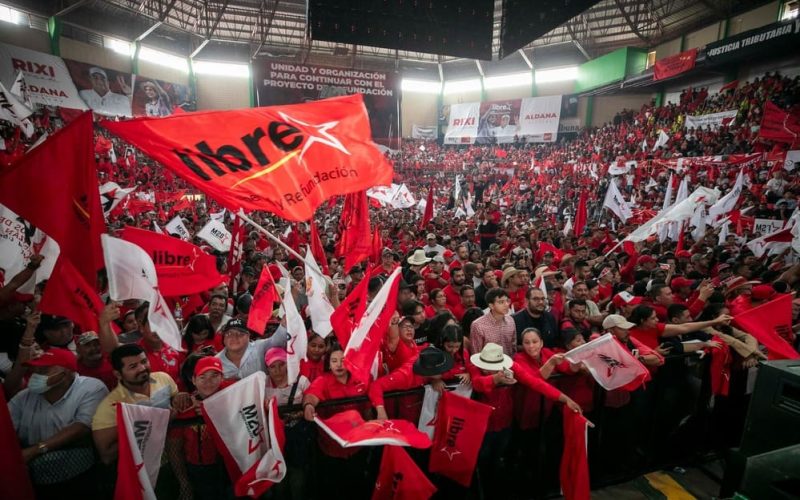In the run-up to the 2025 general elections, the ruling Libertad y Refundación (LIBRE) party faces strong criticism from political, business, and social actors who accuse it of promoting actions that compromise the transparency and legitimacy of the electoral process. The allegations range from blockades of key institutions to attempts to gain political control of the electoral body.
Inquiries regarding LIBRE’s involvement in the National Electoral Council
One of the main sources of controversy has been the interruption of the contracting process for the Preliminary Election Results Transmission System (TREP), a tool considered essential to guarantee transparency in the vote count. On July 7, protesters identified with LIBRE blocked the entrance to the National Electoral Council (CNE) facilities, preventing bidding companies from submitting their technical proposals.
CNE President Cossette López characterized these measures as a direct assault on the voting process, cautioning about their adverse effects on the trustworthiness of democratic bodies. The disruption of the TREP process not only hindered election planning but also heightened the belief that efforts are underway to establish a scenario favorable to altering the outcomes.
Furthermore, there have been accounts of organizational influence from groups connected to LIBRE, such as breaches into the National Congress and other governmental bodies. These incidents, collectively, have been seen by opposition groups as a strategy to undermine the independent operation of the CNE and to ease its potential political dominance.
Dangers of power centralization within the electoral authority
The potential scenario where CNE representatives linked to the governing party might take on responsibilities if current council members are deemed ineligible has raised concerns among political figures who think that such a substitution would compromise the diversity of the electoral body. The National Congress and various analytical platforms have expressed that a CNE lacking oversight could threaten the fairness of the electoral process.
Several voices have advocated for international bodies to supervise institutional resolutions concerning the procedure and ensure equal opportunities in competition. Additionally, accusations have surfaced regarding the supposed instrumentalization of other governmental bodies, including the Public Ministry and the Legislative Branch, to align the CNE with the ruling party’s interests.
These tensions have led to calls from various sectors to strengthen electoral oversight and observation mechanisms in response to what they consider a growing threat to the integrity of the democratic process.
Claims of misinformation and influence on voters
Another line of criticism against LIBRE concerns the dissemination of polls considered false or manipulated that project a wide lead for the ruling party’s pre-candidate, Rixi Moncada. Several of these polls have been denied by the polling firms themselves, which have denounced the misuse of their names and methodologies.
The distribution of these surveys has been seen as a tactic to mold public opinion and instill the notion of certain triumph, which, according to opposing factions, aims to sway the outcomes of the elections and undermine the legitimacy of a potential loss. Such actions have played a role in intensifying the atmosphere of skepticism about the electoral process.
En un contexto que ya se caracteriza por el deterioro del diálogo político y la polarización institucional, la expansión de información engañosa se ha transformado en un factor adicional de inestabilidad, con posibles efectos en la participación ciudadana y la aceptación de los resultados.
A pre-election scenario marked by mistrust
The combination of institutional blockages, disputes over control of the CNE, and disinformation campaigns has placed the Honduran electoral process in a highly fragile situation. Warnings about a possible governance crisis reflect the depth of political tensions in a context where institutions are under pressure and channels for consensus remain closed.
With fewer than five months remaining until the general elections, the situation presents significant hurdles for the credibility of the voting system and the nation’s stability. In this context, focus is placed on the capability of political and institutional figures to reestablish basic levels of confidence and guarantee a legitimate and clear electoral process.
